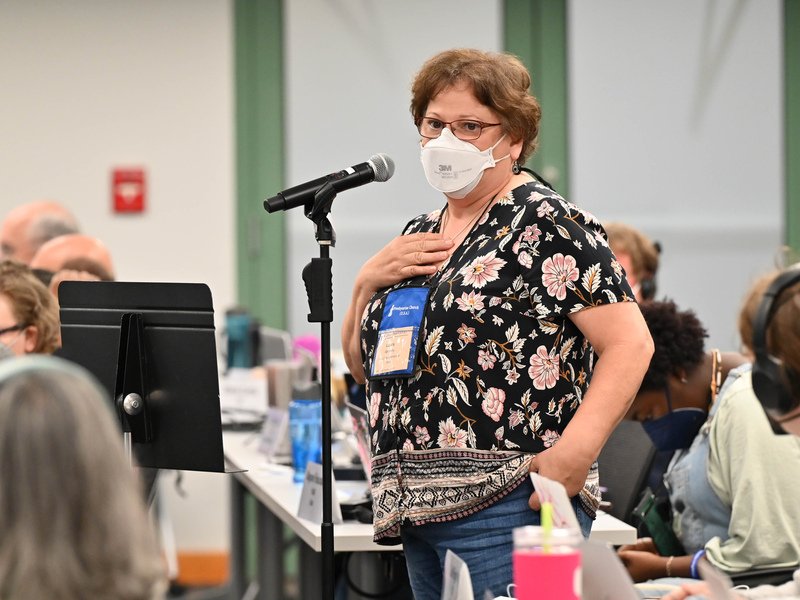
Lazara Delgado Abernathy, a ruling elder from Fort Worth, Texas, spoke during opening activities of the Health, Safety and Benefits Committee on June 23, 2022. (Photo by Rich Copley)

Lazara Delgado Abernathy, a ruling elder from Fort Worth, Texas, spoke during opening activities of the Health, Safety and Benefits Committee on June 23, 2022. (Photo by Rich Copley)
The Health, Safety and Benefits Committee approved three items Thursday designed to strengthen and extend mental health ministry throughout the denomination.
HSB-08, recommended by the Advisory Committee on Social Witness Policy, is the most sweeping of the three. It directs the Presbyterian Mission Agency to create a new policy and study resource around mental health concerns, rather than updating the current resource, “Comfort My People: A Policy Statement on Serious Mental Illness,” which dates back to 2008.
It also directs the PMA to formulate a writing team that “should include a diverse body of people with lived experience of mental health concerns, class, race, sexual orientation and body diversity,” and encourages including a young adult or campus minster. The writing team will follow the guidance of the Presbyterian Mental Health Network regarding language and process.
“We want to create a new primary policy to guide our work,” Jeromey Howard, a member of ACSWP, told the committee. “We want to make resources accessible and easy to use.”
The new resource is expected to cost $3,500.
HSB-02, an overture from Winnebago Presbytery, is on “commending and furthering mental health ministry in the PC(USA).” In addition to six items contained in the original overture, the committee also approved a seventh, put forward by ACSWP. That paragraph encourages the PMA to release materials guiding ministers, congregations, mid councils and seminaries "on how to care for the unique mental health needs of church members during times of prolonged emergency and isolation, sharing lessons learned in the process of dealing with … the pandemic.”
Overture Advocate the Rev. Rose McCurdy, membership chair of the Presbyterian Mental Health Network, appeared via Zoom to share a few facts with the committee: One in five Americans has a diagnosable mental health disorder, or 20 members of a 100-member congregation. “That’s a choir’s worth,” McCurdy said. Nationally, that means about 240,000 Presbyterians have a diagnosable mental health disorder, as do about 4,000 Presbyterian clergy.
“We’d love it if every pastor in the denomination had Mental Health 101,” McCurdy said. “If the Assembly continues to support and advocate for mental health, we can all bring it further into focus for the health of the church.”
The overture also commends the Presbyterian Mental Health Network “for its grassroots work to begin connecting congregations, mid councils and seminaries engaged in mental health ministry so that they might share ideas, spark innovation, discover best practices, lead the church to launch effective mental health ministries, encourage one another in important but sometimes difficult ministry, and thereby bring hope to those living with mental health concerns and save lives.”
The Rev. Dr. Laurie Kraus, director of Presbyterian Disaster Assistance and the associate director of Compassion, Peace & Justice ministries, said that $256,000 in small grants has been awarded to mid councils and congregations over the last four years to help them bolster their mental health services. Another $60,000 has been reserved for about 10 grants in 2022. “We try to award grants that deal with the whole person,” Kraus told committee members.
The Presbyterian Mental Health Network “remains a congregation- and community-based body of leaders working on mental health issues,” Kraus said. “Pastoral mental health is not the primary focus, but it is part of the concern and the interest.” PDA, she said, “has done a lot of resiliency and lament work with mid councils and pastoral leadership. There are a lot of hurting clergy and mid council leaders in this church.”
HSB-04 came to the committee — and will go on to the full Assembly — from the PMA Board. Among other things, it recommends extending funding for mental health ministry grants.
After the committee had approved all three items, Moderator David Ammons, a commissioner from Olympia Presbytery, said “good work had been done on mental health, a besetting issue in our culture right now. People are talking about mental health as being on par with physical health. I’m happy to see our denomination extend its interest and capacity-building on mental health, taking this into the church and the culture beyond.”
